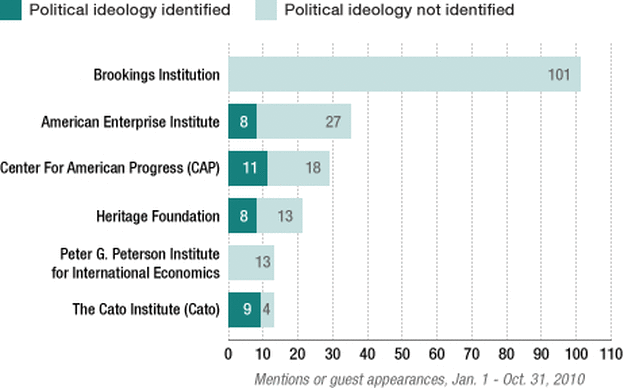
Last year NPR did a self-assessment of how well it identifies think tanks in terms of political leanings.
Following are some excerpts from the NPR assessment:
Lots of things drive NPR's audience crazy. One I totally agree with is this: NPR often does a lousy job of identifying the background of think tanks or other groups when quoting their experts.
NPR also rarely explains why listeners should pay attention to the experts it chooses to quote. This matters.
- If you hear from experts at the Cato Institute, you need to know they market themselves as libertarians.
- If you hear from the Center for American Progress, NPR needs to make clear that most of its experts represent a liberal or "progressive" point of view.
- If you hear an expert from the Peter G. Peterson Institute for International Economics, you need to know that it is funded in part by its former chairman, Peter G. Peterson, a former Commerce secretary and Wall Street investor.
- Peterson is now spending his considerable fortune promoting long-term debt reduction, which is the chief cause of a different organization called the Peter G. Peterson Foundation.
Just to see how well NPR identified experts, my staff looked at how NPR reporters and shows identified think tanks between Jan. 1 and Oct. 31, 2010. It became clear that NPR often cites think tanks and the experts who work for them – but neglects to use more than their names.
FINDINGS:
After the publication of the assessment, the Peterson Institute for International Economics (PIIE) contacted NPR and asked them to clarify a few points. Said PIIE's Steven Weisman:
- Peter G. Peterson Institute for International Economics: 13 total, 0 identified
- Cato Institute: 13 total, 9 identified (2 as "fiscally conservative," 7 as "libertarian")
- Center for American Progress: 29 total, 11 identified (2 as "left-leaning," 1 as "Obama-friendly," 8 as "liberal")
- Heritage Foundation: 21 total, 8 identified (all as "conservative")
- Brookings Institution: 101 total, 0 identified
- American Enterprise Institute: 35 total, 8 identified (7 as "conservative," 1 as "neo-conservative")
Contrary to the suggestion of your posting, the Peterson Institute for International Economics has no "political ideology" and is widely recognized as nonpartisan. A 2005 survey of media citations by the magazine The International Economy found us to be one of only three out of the seventeen most influential think tanks labeled as nonpartisan. (The other two were the Center for Strategic and International Studies, or CSIS, and the Council on Foreign Relations.)
In addition a study of media bias published in the highly respected and peer-reviewed Quarterly Journal of Economics (edited by the Economics Department of Harvard University) described our ideological label in 2005 as "not identifiable" or "neutral." (Tim Groseclose and Jeffrey Milyo, "A Measure of Media Bias," Quarterly Journal of Economics , November 2005, pp.1191-1237.) The authors calculated all citations of think-tanks over a ten year period by members of Congress using the Americans for Democratic Action scores of those members. On a scale in which 100 is the most liberal and 1 is the most conservative, we were rated 48.8—almost precisely at the center of the American political spectrum.)
As for Peter G. Peterson, Mr. Peterson helped to establish the institute in 1981 and in 2006 the institute changed its name to the Peterson Institute to recognize his generosity and his pivotal role as our Founding Chairman since 1981. The institute, however, derives its funding from highly diversified sources, of which Mr. Peterson and his foundation are only one part. These sources include many foundations, corporations, governments and individuals, as well as the PIIE endowment. As you correctly noted, the Peter G. Peterson Foundation, based in New York, is an entirely separate entity from PIIE.Peter G. Peterson has called himself a Republican and has been labeled as a fiscal conservative, but he has also been affiliated with Democrats. He served in the Richard Nixon (R) Administration and was a Sen. John McCain (R-AZ) "bundler" during his 2008 presidential run. He was also a business advisory board member for Andrew Cuomo's (D) 2010 gubernatorial campaign. Peterson is said to be an "unofficial advisor" to Treasury Secretary Tim Geithner. Here is an interesting post which details some of Peter Peterson's Democratic and Republican dealings. For the record, Fareed Zakaria labels him a Republican. He has given lots of money to both conservative and liberal think tanks. In other words, it is hard to label Peter Peterson's exact political leanings (let alone the ideology of PIIE). What we do know is that Peterson has long advocated for deficit reduction.